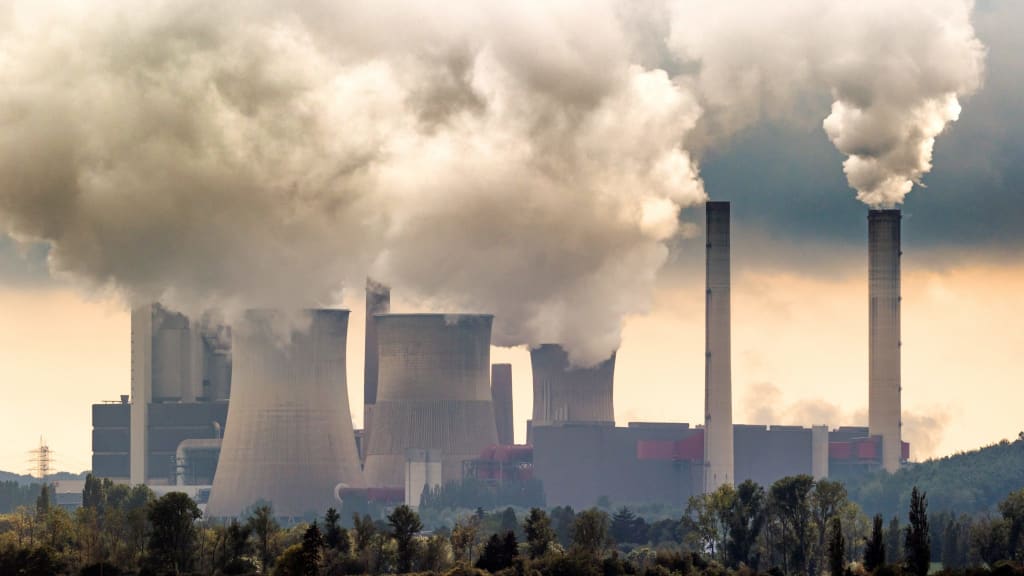Fossil Fuels: Unveiling the Past, Assessing the Present, and Shaping the Future
The subject explores the global movement towards renewable energy and its pivotal role in shaping a sustainable future. With advancements in renewable technologies, increasing awareness of climate change, and the economic opportunities associated with clean energy, the renewable revolution is gaining momentum worldwide. This subject delves into the key drivers and benefits of this transition, highlighting the potential for a more sustainable and resilient energy landscape.

Introduction:
Fossil fuels have powered human civilisation for centuries, but their impact on the environment and climate is becoming increasingly apparent. This article delves into the world of fossil fuels, exploring their origins, their dominant role in energy production, and the urgent need for transitioning to sustainable alternatives. By examining their advantages, drawbacks, and the ongoing energy transition, we can gain a comprehensive understanding of the complex dynamics surrounding fossil fuels.
Origins and Types of Fossil Fuels:
Fossil fuels are formed from the remains of ancient plants and organisms that underwent geological processes over millions of years. The three primary types of fossil fuels are coal, oil, and natural gas. Coal is a carbon-rich rock formed from plant matter, while oil and natural gas are hydrocarbons found deep underground.
Advantages of Fossil Fuels:
Fossil fuels have fuelled rapid industrialisation, technological advancements, and economic growth worldwide. They offer high energy density, making them efficient sources of power for various applications. Fossil fuels have played a significant role in electricity generation, transportation, and manufacturing, providing reliable and affordable energy.
Drawbacks and Environmental Impacts:
Despite their benefits, fossil fuels have significant drawbacks and environmental impacts. The combustion of fossil fuels releases carbon dioxide (CO2) and other greenhouse gases, contributing to climate change. Pollution from burning fossil fuels also leads to air pollution, which adversely affects human health and ecosystems. Additionally, extracting and transporting fossil fuels can cause habitat destruction, water pollution, and land degradation.
Climate Change and the Need for Transition:
Fossil fuels are the primary contributors to anthropogenic greenhouse gas emissions, driving global climate change. The increasing concentration of CO2 in the atmosphere is causing rising temperatures, extreme weather events, and other detrimental impacts. To mitigate climate change, there is an urgent need to transition away from fossil fuels towards sustainable and low-carbon alternatives.
The Energy Transition:
The energy transition involves shifting from fossil fuels to renewable and clean energy sources. Renewable technologies such as solar, wind, hydropower, and geothermal offer environmentally friendly alternatives. The transition also includes improving energy efficiency, implementing energy storage solutions, and adopting sustainable practices in various sectors.
Challenges and Opportunities:
The energy transition presents both challenges and opportunities. Challenges include the need for significant investments in renewable infrastructure, the transition of fossil fuel-dependent economies, and the development of new technologies. However, the transition also offers opportunities for job creation, economic diversification, energy security, and reduced dependence on finite resources.
Policy and Global Cooperation:
Effective policies and international cooperation are crucial for driving the energy transition. Governments must establish supportive regulatory frameworks, incentivise renewable energy adoption, and phase out fossil fuel subsidies. International collaboration is vital for sharing best practices, technology transfer, and addressing the global nature of climate change.
The Future of Energy: Embracing a Renewable Revolution:
The global energy landscape is undergoing a profound transformation as the world embraces renewable energy solutions. This heading highlights the rapid advancements in renewable technologies, the potential they hold for a sustainable future, and the key factors driving the shift towards a renewable revolution.
Advancements in Renewable Technologies:
Renewable energy technologies, such as solar, wind, hydropower, and geothermal, have witnessed remarkable advancements in recent years. Solar photovoltaic (PV) panels are becoming more efficient and affordable, while wind turbines are increasing in size and generating capacity. Innovations in energy storage systems, such as batteries and hydrogen fuel cells, are improving the reliability and flexibility of renewable energy sources. Moreover, emerging technologies like wave and tidal power harness the vast energy potential of oceans. These advancements are driving the feasibility and scalability of renewable energy systems.
The Drive for Sustainability and Climate Action:
The urgency to address climate change and reduce greenhouse gas emissions is a primary driver of the renewable revolution. The devastating impacts of global warming are becoming increasingly apparent, compelling governments, businesses, and individuals to transition to cleaner energy sources. Renewable energy offers a carbon-free alternative to fossil fuels, helping mitigate climate change, improve air quality, and reduce dependence on finite resources. The global commitment to the Paris Agreement and the growing recognition of the economic and environmental benefits of renewable energy are propelling the sustainable energy transition forward.
Economic Opportunities and Job Creation:
The renewable revolution presents significant economic opportunities and job creation potential. Investments in renewable energy infrastructure stimulate economic growth, foster innovation, and attract private capital. The renewable energy sector has become a major employer, offering a wide range of job opportunities in manufacturing, installation, maintenance, and research. Local communities benefit from the development of renewable energy projects, as they create sustainable livelihoods, revitalise rural economies, and promote energy independence.
Energy Access and Decentralisation:
Renewable energy technologies offer the potential to expand energy access globally, particularly in remote and underserved areas. Off-grid solar systems and mini-grids powered by renewable sources provide electricity to communities that are not connected to centralised grids. The decentralisation of energy systems empowers individuals and communities to generate their own clean energy, reducing reliance on centralised fossil fuel power plants and enhancing energy security. Furthermore, renewable energy promotes energy equity and inclusivity, bridging the energy gap and improving living standards for marginalised populations.
Collaboration and Policy Support:
Successful implementation of the renewable revolution relies on collaboration among governments, businesses, and civil society. Robust policy frameworks and supportive regulations are essential to drive the transition to renewable energy. Governments play a vital role in providing incentives, setting renewable energy targets, and implementing supportive policies. International cooperation, knowledge sharing, and technology transfer are crucial for scaling up renewable energy deployment and overcoming barriers to implementation.
Conclusion:
Fossil fuels have shaped our world but come at a significant cost to the environment and climate. The urgent need to address climate change requires a swift transition to sustainable energy sources. By embracing renewable technologies, improving energy efficiency, and fostering global cooperation, we can navigate the complex challenges of the energy transition and build a cleaner, more sustainable future for generations to come.






Comments
There are no comments for this story
Be the first to respond and start the conversation.